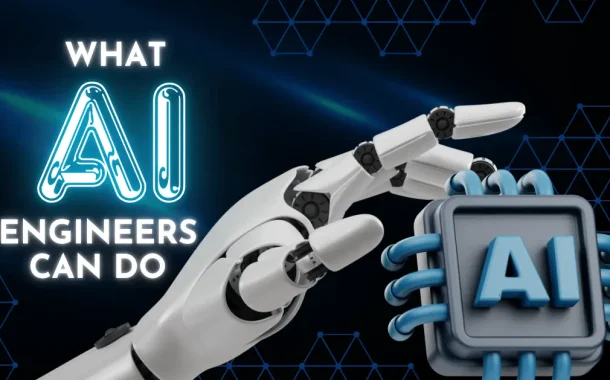AI is becoming essential in our daily lives. It powers voice assistants, smart home devices, and personalized recommendations. In business, AI helps improve decision-making, customer service, and operations. It also aids in solving complex problems, like predicting diseases or managing large amounts of data.
Table of Contents
Table of Contents
Key Responsibilities of an AI Engineer
Developing AI Models and Algorithms
AI engineers design and develop machine learning models and algorithms that allow systems to learn from data. They work on creating programs that can perform tasks like image recognition, natural language processing, and predictive analysis. This involves selecting the right model, fine-tuning it, and using techniques like deep learning to enhance its accuracy and efficiency.
Data Collection and Analysis
A critical part of an AI engineer’s role is managing data, which is the backbone of AI systems. They collect large datasets from various sources and ensure it is clean, accurate, and ready for use. They analyze this data to understand patterns, trends, and behaviors that can be used to train AI models. Proper data management is essential for developing reliable AI solutions.
Collaborating with Cross-Functional Teams
AI engineers often work with different teams, such as data scientists, software developers, and business managers. They help translate complex technical concepts into practical business applications. By working together, they ensure the AI solutions developed are aligned with the organization’s goals and can be effectively integrated into existing systems.
Testing and Optimizing AI Solutions
Once an AI model is developed, AI engineers test it rigorously to identify any errors or weaknesses. They perform various tests to ensure the model functions correctly and meets performance standards. They continuously optimize and update the AI models based on new data or changing requirements, ensuring the solutions remain effective and relevant over time.
Skills Required for an AI Engineer
Technical Skills
AI engineers need a strong knowledge of programming languages like Python, R, or Java, as these are essential for developing AI models and algorithms. They should understand machine learning frameworks like TensorFlow, PyTorch, or Keras. Knowledge of data science, statistics, and mathematics is crucial for analyzing data and building accurate models. Familiarity with cloud platforms, such as AWS or Azure, helps in deploying AI solutions effectively.
Analytical and Problem-Solving Skills
AI engineers must be excellent problem solvers, able to analyze complex data and identify patterns or trends. They should be able to think critically and creatively to develop effective AI solutions for real-world challenges. This includes the ability to break down complicated problems into smaller, manageable tasks and find innovative approaches to improve AI models.
Communication and Teamwork Skills
Strong communication skills are vital for AI engineers to explain technical details to non-technical stakeholders. They need to collaborate effectively with other team members, including data scientists, software developers, and business managers. The ability to convey complex concepts clearly and concisely helps ensure that AI solutions meet business needs and are successfully implemented.
Continuous Learning and Adaptability
AI is a rapidly evolving field, so AI engineers must stay updated with the latest tools, technologies, and trends. They should have a passion for learning and be willing to adapt to new methods, frameworks, and approaches. Continuous learning is essential for developing innovative AI solutions and staying ahead in a competitive market.
Tools and Technologies Used in AI Engineering
Programming Languages
AI engineers use programming languages like Python, R, and Java to develop AI models and algorithms. Python is the most popular due to its simplicity and extensive libraries, such as NumPy, pandas, and SciPy, which support data manipulation and analysis. R is favored for statistical computing, while Java is often used for integrating AI models into larger software systems.
Machine Learning Frameworks
Frameworks like TensorFlow, PyTorch, and Keras are essential tools for building and training machine learning models. TensorFlow, developed by Google, provides a comprehensive ecosystem for developing both simple and complex AI models. PyTorch, created by Facebook, is known for its flexibility and ease of use, especially for research and experimentation. Keras is a high-level API that works with TensorFlow, simplifying the model-building process.
Data Science Tools
AI engineers use data science tools like Jupyter Notebook, Apache Spark, and SQL for data analysis and visualization. Jupyter Notebook is a popular tool for creating and sharing code, visualizations, and data analyses in an interactive environment. Apache Spark helps process large datasets quickly, while SQL is used to query and manage data in databases.
Cloud Platforms and Services
Cloud platforms like Amazon Web Services (AWS), Microsoft Azure, and Google Cloud Platform (GCP) provide resources for deploying and managing AI applications. These platforms offer services like AI model training, data storage, and computing power, making it easier to scale AI solutions. Tools like AWS SageMaker, Azure Machine Learning, and Google AI Platform simplify building, training, and deploying machine learning models.
Career Path and Opportunities in AI Engineering
Entry-Level Positions
AI engineers typically start in entry-level roles like junior AI engineer, machine learning engineer, or data analyst. These positions involve tasks like data collection, basic model development, and supporting senior engineers with algorithm testing and deployment. Entry-level roles provide hands-on experience with AI tools and frameworks and help develop foundational skills in programming, data analysis, and model building.
Advancement Opportunities
With experience, AI engineers can advance to more specialized roles like senior AI engineer, data scientist, or AI architect. These roles involve designing complex AI models, leading research projects, and developing innovative AI solutions. Some may move into managerial positions, such as AI project manager or team lead, where they oversee projects, mentor junior staff, and work closely with other departments to align AI solutions with business goals.
Industry Specializations
AI engineers have opportunities to specialize in various industries like healthcare, finance, automotive, or e-commerce. In healthcare, they might develop AI models to analyze medical images or predict patient outcomes. In finance, they could create algorithms for fraud detection or investment analysis. Each industry offers unique challenges and opportunities, allowing AI engineers to tailor their careers based on their interests and expertise.
Future of AI Engineering
The demand for AI engineers is expected to grow as AI continues to advance and integrate into more sectors. Opportunities will expand in areas like natural language processing, autonomous systems, and AI ethics. With constant technological advancements, AI engineers will play a critical role in shaping the future, driving innovation, and solving complex global challenges.
Conclusion
AI engineers play a vital role in developing smart technologies that shape our world. They design and build AI models, manage data, and work with teams to create solutions that improve daily life and business operations. Their work helps in areas like healthcare, finance, and retail, making processes faster, more efficient, and more accurate.
With the increasing use of AI across various industries, the demand for skilled AI engineers continues to grow. They have a range of career opportunities, from entry-level positions to specialized roles and leadership positions. As AI technology advances, AI engineers will remain essential in driving innovation and solving complex problems.














